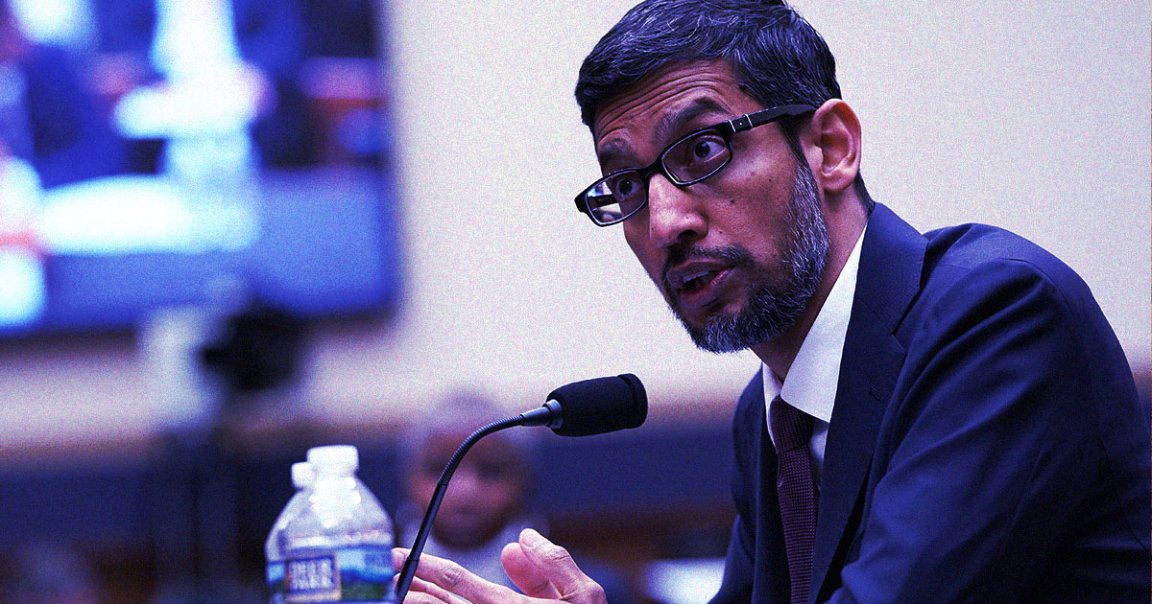
Google CEO Sundar Pichai, who’s currently hard at work automating human labor at an incredible scale, is very confused as to why anyone might suggest that AI might replace human workers.
Fresh on the heels of Google’s Wall Street-winning and heavily AI-focused I/O conference, Pichai made an appearance on The Verge‘s Decoder podcast. And editor-in-chief Nilay Patel wasted no time in hitting him with some tough questions about AI-abetted job losses.
“If you believe it’s a platform shift, this might be the first platform shift that regulators understand because it’s very obvious what kind of labor will be displaced,” said Patel. “Lawyers, mostly, is what I gather, right? They can see, okay, a bunch of white-collar labor will go away, like a C-plus email about a transaction, entire floors of those people can be reduced.”
Patel’s question isn’t exactly out of left field. Some industries have already seen job losses, while a recent Goldman-Sachs memo estimated that roughly 300 million jobs could feasibly be delegated to AI.
Pichai, however, didn’t quite rise to the occasion.
“For 20 years of tech automation, people have predicted all kinds of jobs would go away,” Pichai responded, adding that “movie theaters were supposed to end” as the result of tech innovation. That’s an interesting choice on Pichai’s behalf, considering that theater attendance has been steadily declining since 2002, not to mention that Hollywood is in the throes of a writer’s strike in which AI has emerged as a major issue.
But when Patel pointed out that the film industry is in decline, the Google CEO almost seemed at a loss for words.
“There’s always going to be… Unemployment over the last 20 years of tech automation hasn’t fully… Twenty years ago, when people exactly predicted what tech automation would do, there are very specific pronouncements of entire job categories which would go away,” said a seemingly flustered Pichai. “That hasn’t fully played out.”
“I don’t know. I don’t know,” he added later. “So it’s not exactly clear to me how all this plays out.”
Elsewhere, Pichai claimed that “new professions [are] constantly getting created,” though he conceded that “big societal labor market disruption” will occur and “governments need to be involved.”
“But I think we shouldn’t underestimate the beneficial side of some of these things, too,” he added. “And it’s complicated, is maybe how I would say it.”
To his credit, it’s true that no one really knows what’s on the other side of the brimming AI hype wave.
Still, it’s hard not to find Pichai’s answer to the automation question a little disappointing. Several industries — including journalism, videogame design, and tech — have already replaced human labor with automated tools, and some of those industries have even witnessed layoffs in the wake of the tech’s rollout.
Right now, though, it very much looks like AI could have a radical impact on the labor market — and Google will have played an instrumental role in that.
Look, we’re not saying that Pichai needs to be particularly sympathetic about layoffs. But since this is one of the biggest questions that the public is currently asking about AI, and he’s the CEO of a company that practically controls the internet, Pichai’s around-the-bush response just falls short.
In fact, he just sounded deflated.
“There’s a new technology,” Pichai told the Verge. “It has a chance to bring unprecedented benefits. It has downsides. I think you are right.”
“I think we need to think about it,” he added. “We need to anticipate as early as we can.”
More on AI and the job industry: IBM Replacing 7,800 Human Jobs with AI, Including Human Resources